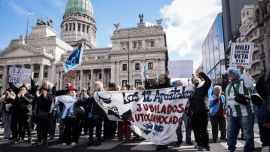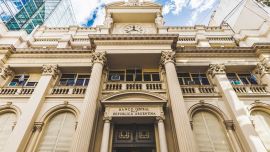Argentina’s ruling Frente de Todos coalition suffered its biggest political defeat in two years in office after a primary election that saw the opposition winning most districts, putting the government of President Alberto Fernández under pressure.
The opposition coalition Juntos por el Cambio has unexpectedly won the key district of Province of Buenos Aires, which accounts for more than a third of the country’s electorate, by 4.4 percentage points with 97 percent of the votes counted. On a national level, the opposition leads by twice that margin in the race for the lower house Chamber of Deputies and by almost 16 percentage points in the senate, according to a tally compiled by the La Nación newspaper.
The primary vote to pick candidates ahead of a midterm on November 14 reflects voters’ growing discontent over Fernández’s pandemic strategy, rising poverty and annual inflation that has surged to 50 percent. His coalition lost congressional battles in districts typically favourable to the Peronist government, such as La Pampa, Chubut, Chaco, Tierra del Fuego and even Santa Cruz, the home province of Vice-President Cristina Fernández de Kirchner.
In a speech Sunday night, Fernández acknowledged the defeat and promised to work on reversing the results.
“Evidently, there’s something we didn’t do right to get people to give us their support as we wished they had,” he said at the government’s campaign headquarters in Buenos Aires. “The campaign has just begun and we still have two months. We need to win it.”
Next moves
With mandatory voting for most adults, the primary effectively serves as a nationwide opinion poll ahead of the midterm, when half of the lower house seats in Congress and a third of the Senate are on the ballot. While investors would cheer the anti-business ruling coalition for losing significant ground, the government will now be under pressure to try to reverse these results.
“The chances that this produces cabinet changes before November 14 have grown significantly with these results,” Lucas Romero, director of consulting firm Synopsis Consultores, said in a phone interview. “We’re seeing a marked setback for the ruling coalition in almost all the provinces.”
“Argentina’s primary election results are a double-edged sword for the economic outlook – raising hope for a swing to more market-friendly policies longer term, but boosting the near-term risk President Alberto Fernández doubles down on populist policies ahead of the actual vote on November 14,” said Bloomberg's Latin America economist Adriana Dupita.
About 67 percent of the electorate cast their votes on Sunday, a record low for Argentina.
If Sunday’s results are repeated in the midterm, the government coalition would not only lose its simple majority in the Senate but also its first minority in the lower house to the Juntos bloc, according to Diego Pereira, an economist at JPMorgan Chase & Co.
Now attention will turn to Fernández’s next policy moves within a shaky coalition where Fernández de Kirchner, who ruled the country between 2007 and 2015, represents more hard-left positions. Some analysts say that more unorthodox measures could complicate the government’s ongoing negotiations with the International Monetary Fund to reschedule payments on US$45 billion owed to the institution.
The discussion now is “if the government is to turn for pragmatism or strengthen its heterodox derivative,” JPMorgan’s Pereira wrote in a note to clients. “Any credible amendment to the policy framework entails political costs, which in our view suggests low probability of effective and positive policy changes before November.”
Argentina, which is shut from international debt markets, has to pay back more than US$4 billion to the IMF before the end of the year.
related news
by Patrick Gillespie & Jorgelina do Rosario, Bloomberg




















Comments